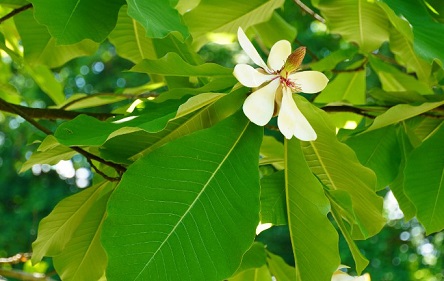Nikhil Prasad Fact checked by:Thailand Medical News Jun 20, 2024 10 months, 5 days, 2 hours, 14 minutes ago
Herbs And Phytochemicals: In the quest for natural remedies to combat modern health issues, honokiol, a compound derived from the bark of the Magnolia tree, has been making waves. This naturally occurring substance has shown promise in various medical fields, from fighting cancer to reducing inflammation. Recently, scientists from Mianyang Teacher’s College-China have been exploring its potential to help manage type 2 diabetes by inhibiting a key enzyme involved in carbohydrate digestion. This
Herbs And Phytochemicals news report covers their study findings.
 Honokiol From the Magnolia Tree as a Natural Alpha-Glucosidase Inhibitor
Honokiol From the Magnolia Tree as a Natural Alpha-Glucosidase Inhibitor
for Diabetes Management
Understanding Type 2 Diabetes and the Role of α-Glucosidase
Type 2 diabetes mellitus (T2DM) is a chronic condition that affects millions worldwide. It is characterized by high blood sugar levels, which can lead to serious health complications if not managed properly. One way to control blood sugar levels is by slowing down the digestion of carbohydrates, which in turn reduces the spike in blood sugar after meals. This is where the enzyme α-glucosidase comes into play.
The Function of α-Glucosidase
α-Glucosidase is an enzyme found in the small intestine that breaks down carbohydrates into glucose, which then enters the bloodstream. By inhibiting this enzyme, it is possible to slow down carbohydrate digestion, thereby managing post-meal blood sugar levels. Current medications for diabetes, such as acarbose and voglibose, work by inhibiting α-glucosidase. However, these drugs can have side effects, prompting the search for natural alternatives.
Honokiol: A Natural α-Glucosidase Inhibitor
The study team conducted a detailed research to investigate the potential of honokiol as an α-glucosidase inhibitor. Their findings, reveal that honokiol can effectively inhibit α-glucosidase, offering a natural solution for managing blood sugar levels in diabetes patients.
Study Findings: How Honokiol Works
The study showed that honokiol is a mixed-type inhibitor of α-glucosidase, meaning it can bind to both the enzyme and the enzyme-substrate complex, making it more effective. The researchers determined the IC50 value of honokiol, which is the concentration required to inhibit 50% of the enzyme’s activity. Honokiol exhibited an IC50 value of 317.11 µM, indicating strong inhibitory activity compared to traditional drugs.
Mechanism of Inhibition: A Closer Look
To understand how honokiol inhibits α-glucosidase, the researchers used various techniques:
-Fluorescence Spectroscopy: This technique revealed that honokiol binds to α-glucosidase, causing a decrease in the enzyme’s activity.
-3D Fluorescence and Circular
Dichroism (CD) Spectra: These methods showed that the binding of honokiol to α-glucosidase causes changes in the enzyme’s structure, further inhibiting its activity.
-Molecular Docking: This computer simulation illustrated the interactions between honokiol and α-glucosidase, highlighting hydrogen and hydrophobic bonds that contribute to the inhibition.
Advantages of Honokiol Over Synthetic Drugs
One of the key benefits of using natural products like honokiol is their lower toxicity compared to synthetic drugs. This makes them safer for long-term use. Honokiol not only inhibits α-glucosidase but also exhibits other health benefits, such as anti-inflammatory and antioxidant properties, making it a multifunctional compound.
Conclusion: A Promising Future for Honokiol
The research conducted underscores the potential of honokiol as a natural alternative for managing type 2 diabetes. By inhibiting α-glucosidase, honokiol can help control blood sugar levels without the side effects associated with conventional drugs. As research progresses, honokiol could become a valuable addition to the arsenal of natural remedies for diabetes management.
Looking Ahead: Further Research and Development
While the findings are promising, further research is needed to fully understand the potential of honokiol in clinical settings. Future studies will focus on its efficacy in humans, optimal dosages, and long-term effects. If these studies confirm the benefits of honokiol, it could pave the way for new, natural diabetes treatments that are both effective and safe.
In the meantime, honokiol stands as a beacon of hope in the ongoing battle against type 2 diabetes, offering a natural, less toxic solution for millions of patients worldwide.
The study findings were published in the peer reviewed journal: Frontiers in Pharmacology.
https://www.frontiersin.org/journals/pharmacology/articles/10.3389/fphar.2024.1425832/full
For the latest on
Herbs And Phytochemicals, keep on logging to Thailand Medical News.
Read Also:
https://www.thailandmedical.news/news/herbs-and-phytochemicals-international-study-explores-the-phytochemical-honokiol-from-the-plant-magnolia-officinalis-for-its-anticancer-properties
https://www.thailandmedical.news/news/herbs-and-phytochemicals-in-the-fight-against-diabetic-retinopathy-an-emerging-frontier
